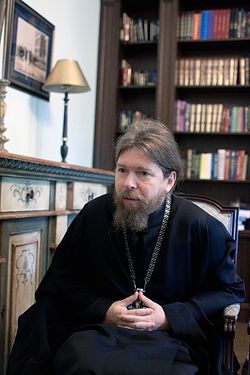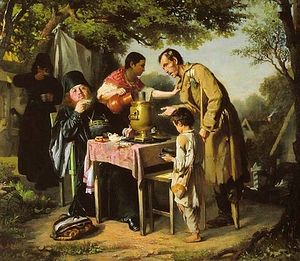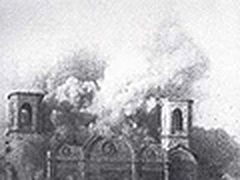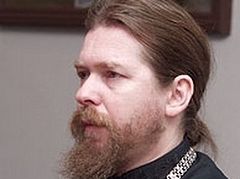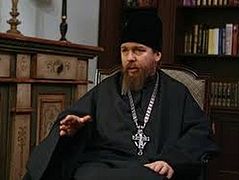Sretensky Monastery wakes up early: the interview with Fr. Tikhon starts at 8:30 a.m.! By this time, part of the day at Sretensky has already passed: the brothers' moleben has been served, the seminarians have finished breakfast; before class begins, they are at their obediences—some of them are sweeping the pavement outside the church, for example.
I am standing in the monastery garden, which is no less manicured then the Botanical Gardens. As I wait to be conducted to the abbot, I look at the faces of the seminarians and of the parishioners hastening to church on this ordinary weekday, not a feast day, at this early hour… Fr. Tikhon's reception room is spacious, with enormous bookshelves from which a portrait of Emperor Alexander looks at us; while on another shelf I see...
—See that picture of Metropolitan Laurus? It's a nice one, isn't it? It captures his facial expression exactly.
Yes, Metropolitan Laurus came to Russia from distant America many times in the guise of a simple monk, to travel to monasteries, and breathe in the faith.
Where has our faith gone? This is the subject of our conversation today with Fr. Tikhon.
—Fr. Tikhon, where has our faith gone, our need for Church services and prayer, our joy?
—Once, I was talking with Archimandrite Seraphim (Rosenberg). This was not long before his death. He was from a family of German barons; after graduating from Tartu University (Estonia) in the 1930's, he left for the Pskov-Caves Monastery, where he lived for sixty years. During this conversation, Fr. Seraphim spoke about monasticism. He said that the greatest problem of modern monasticism is the lack of resolve.Probably this could be said not only of monks, but also of many of our contemporary Orthodox Christians.
Resolve, courage, and the spiritual nobility connected with these qualities are noticeably lacking. But if people understand throughout their lives the most important thing—to go to God regardless of any obstacles and temptations, to be faithful to Him—they will not waver in their faith to the point of losing it.
This crisis of faith that you are speaking about is most obvious in our teenagers. From age eight to nine the children go to church, sing on the cliros, amazing and delighting everyone around them. But by age fourteen to sixteen, many, if not the majority, stop going to church.
—Why does this happen?
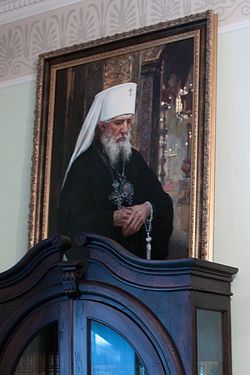 Metropolitan Laurus
Metropolitan Laurus How does it happen that children do not notice God despite the adults' most sincere efforts to instill faith in them? How does it come to be, that the child does not find the strength in himself to see Christ the Savior in his life, in the Gospels? By answering these questions to ourselves, we raise another adult problem which is reflected in our children as in a mirror. This is when both parents and priests teach one thing, but live another. This is the most terrible blow to the tender strength of a child's faith, and an unbearable drama for their sensitive awareness.
There are other examples. I could name them, but I especially remember this one: during my first trip to Germany in 1990, I received to my great surprise a good lesson from one priest, a Catholic. I was amazed by his congregation—very pure young people age sixteen to twenty, sincerely striving to live the Christian life. I asked this priest how he was able to guard these teenagers from the aggressive pressure of temptations and pleasures so normal to their peers in the West. He looked at me with complete perplexity. He said something that simply crushed me with its simplicity and clarity (I am very sorry that I did not hear this from an Orthodox priest): "They just love Christ more than all those pleasures!"
—And our situation is different?
—No, of course not! There are many shining examples amongst us, glory be to God. In our Sretensky Seminary I see remarkably pure and sincere young men; although of course, temptations happen—that is life.
—But they are youths. What about the people who come to church as adults?
—What is the difference? Something similar happens to adults. We also tempt each other (in this case, the little ones the Savior describes are not necessarily children according to age) by our lukewarmness, our conscious transgressions of the Gospel commandments, by our impure life. Gradually, people get the impression that a Christian can live however he likes. If this happens, people who have come to the faith as adults gradually lose interest in spiritual life, and everything bores them. There is no real relationship with God, which means there is no life of the spirit. During the first three years or so of faith, Orthodoxy is interesting; a new life enthralls us and brings a mass of new impressions. Then comes everyday life.
Probably it is like family life. You have to labor, endure and endure—first of all, yourself. This really is hard. For those who have come to the faith at age, say, twenty-five, there are some fifty years of this work ahead. It has always been this way; no need to be surprised. This dryness is, as a rule, an inevitable stage of spiritual life. St. Theophan the Recluse for example writes much and interestingly about this. This is a segment of the path, a desert that we have to get through. Unfortunately, not all of our brothers and sisters get through this segment. Some even dig themselves into those barren sands with great pleasure forever; and it can be very difficult to work one's way out of them.
—Where does this dryness come from? A person does everything he is supposed to do—he goes to confession, recounts all of those things that he knows are called sins, reads the prayer rule, approaches the chalice; and the further he goes, the more this seems to be formalism, a mechanical action of "reading," "standing through the service," and "telling something at confession." What should he do? What is the right thing?
—In Holy Scripture it is stated very expressly how to revive the soul, how to make the soul young and alive again. Seek God, and your soul shall live (Ps. 68:32). Seek God, no matter what! Stubbornly and persistently. Then the promise of the Lord Jesus Christ will be fulfilled: Seek, and ye shall find (Mt. 7:7; Lk. 11:9).
But if the search for God, the thirst for God, the desire to attain Him disappears, this is cause for very serious alarm. You have to labor and use any means to restore this desire in your soul. Without it, nothing good can come. Or, you may have to wait, as the parched earth waits for rain, for trials that shake up the soul, sickness, serious wounds, and temptations.
—But is this possible for the laity?
—For the laity? It is possible precisely for them! As Fr. John (Krestiankin) said, in our days, strong Christians are saved in the world, while weak ones are saved in monasteries. When you confess parishioners or talk with them, you see what amazing podvizhniks (ascetical laborers) there are among the laity, and we who call ourselves monks should learn from them.
I remember once during the mid 1980's, I was walking with Fr. John (Krestiankin) in the Pskov-Caves Monastery. Suddenly, an agitated young man ran up, "pale, with a heated gaze," and began complaining loudly, "Batiushka, Moscow is such a disgusting city, a new Babylon! People are godless and terrifying!" Then Fr. John covered the man's mouth with his hand and said sternly, "What are you saying? In Moscow, forty Divine Liturgies are served every day, in forty churches! There are such amazing podvizhniks living unknown to the world, somewhere on the eighth floor of a twelve-story block building! True saints, such as you cannot even imagine." I was amazed at the time, because I thought that podvizhniks only lived in distant monasteries, somewhere on Solovki or in Egypt. But now—and this is the truth—I myself see remarkable podvizhniks, simple laypeople, who teach and save me by humbling me, and showing me how it is possible to live in our time in a truly ascetic way, as Christians.
—In what does this Christian life consist?
—In the fulfillment of Christ's commandment of love for God and neighbor.
These are ordinary people—women, youths, girls, and grown men. Not to mention the grandmothers, who read such prayer rules that when a monk hears about them—I tell you honestly—he feels uncomfortable. Moreover, they have been fulfilling these rules regularly for decades, with the absolute conviction that they are doing nothing special! A babushka reads so many kathismas for her eldest son, so many for the second, and so many for her youngest daughter. Then she says 1,500 Jesus prayers, just to get a feeling, if only a little, of her own sinfulness. Then the particular prayers of her prayer group, and an Akathist—how could she do without an Akathist?! I am telling you about the real prayer rule of a real parishioner. And such ascetics are innumerable! Besides this, they also work, go to the store, wash and iron clothes, and raise their children and grandchildren. But they are not proud or vain, they consider themselves to be nothing, and are ready at any moment to serve their neighbor. Just associating with such people is amazingly helpful for the faithless to find hope and resolve.
—But is true Christianity only in the reading of prayers?
—Of course not only in the reading of prayers. It is in the reading of prayers as living communion with God! Only, you have to understand that the form of prayer can widely vary. The holy fathers considered that spiritual life is determined by the quality and purity of prayer. However, it goes without saying that if a person thinks he prays, but he is cruel, and does not love people, then one can only pity him. You know, perhaps I am lucky, but it has been a long time since I have met such people.
—There are no few examples of young people who serve in the church, but whose families get no help from them…
—Well, sure, it happens that a person, as they say "goes Kronstadt." He begins to delve into spiritual life and heads toward a bright goal, stepping over all of his poor relatives. This is what a spiritual father is for. There is time. There is misfortune. There is, finally, a fall. But I would not try to represent such grievous cases as today's norm. I would rather say that it is a childhood disease. Many have had the chicken pox, but not all are pockmarked.
—But many people these days talk about just such negative experiences…
—It has become bon ton in certain Orthodox circles to say that a person has "over-prayed": he reads a prayer rule, canons, kathismas, and is just too pious. This is pronounced like a diagnosis. But we are taking the role of judge upon ourselves, for the most part not out of an abundance of spiritual discernment, but rather out of our own weak faith, slothfulness, and self-love. Out of self-defense, our lazy comfort consciously paints a picture of some Feropont from Brothers Karamazov—do you remember that cruel and foolish ascetic of Dostoevsky's?
You know, there is great danger in the fact that we eagerly over-emphasize and exaggerate such morbid instances, and use them, unnoticeably to ourselves, to defend our laziness and indifference. In general, such pernicious generalizations and wrongful stereotypes are circulating more and more in church spheres: if old ladies are church-goers, then they're mean witches; if they are young people, then they have complexes; if they are adults, then they are unlucky in life; if they are altar attendants, then they have abandoned their families for the sake of the church; if they are monks, then they are money-grabbers and reprobates.
—But this does happen to be the case sometimes…
—Who would argue? You can't say that it never happens, that it's not true. However, why should you use a stubbornness worthy of better application to convince yourself and others that such a state of affairs is particular to our Church?
I once took a tour through Orthodox forums, and I was simply put out by how cynically and viciously Orthodox people, who consider themselves quite educated in religious matters, relate not only to the clergy, whom they disdain utterly, but even to the most pious laypeople.
—They say, "Orthodoxized" and "Orthodoxy of the brain"…
—These terms, I'm afraid, have not come from somewhere out there, but from within Orthodox spheres. Only one of "our own" could jab with such sophistication. Nevertheless, these phrases have gained enthusiastic popularity in our midst. This is a truly alarming phenomenon in our Christian community. Furthermore, we ourselves gradually begin to look at ourselves and at those around us through a prism of such humiliating descriptions.
—To act in accordance with traditional piety has become… not comme il faut?
—Do you remember how Tolstoy in his stories, Childhood, Boyhood, and Youth spoke remarkably about comme il faut, how it mercilessly affected his life? Now (fortunately only in fringe circles of the Church, because you simply can't call these people religious), an Orthodox comme il faut is developing, and if a person does not fit into it, he's a social outcast, an absolutely despicable person.
Thus do we arrive at cynicism, and essentially to the source of that same sickness of indifference with which Christians have been infected since the time of the Laodicean Church. The enemy power, which gathers momentum through spiritually tepid Christians within the Church, is infinitely more dangerous than any outward force, more dangerous than persecutions.
We teach our students to never, under any circumstances, become "Orthodox comme il faut." After all, they themselves do not notice how they lose their faith, how they become careerists, and how all values in their lives completely change.
People of the older generation often say when they get together, "How great it was in the sixties and seventies, what faith there was!" We say this not only because we are getting grumbly in our old age, but because that is how it really is. In those days, there was external opposition to the Church from the state, but we were together, and treasured each other. "Orthodoxized" would have been a term conceived in the enemy camp. "Orthodoxy of the brain" could have been uttered only by Emelian Yaroslavsky.[i] An Orthodox person would never have used or repeated such expressions. But now they are heard in Church spheres, people show them off, and are proud of them!
—Why does this attitude form?
—What is happening? People have come to the Church, but have only come to love it partially. Gradually, years later, they are aware in the secret recesses of their souls of a terrible truth: they relate to Orthodoxy with deep contempt. A terrible sickness takes hold of them— traitorous cynicism akin to the deed of Ham. People around them get infected with it one way or another. After all, we are indeed one organism—the Church; and therefore we have to resist this disease somehow.
When the Orthodox encountered this sort of thing during soviet times, they understood that this was "from our enemies," "from the adversary." Now, lessons in contempt and arrogance are coming more and more from people in the Church. We know what the bitter fruits of these lessons are.
—Not a happy prognosis…
—One can only recall the words of St. Ignatius Brianchaninov, when he said that, "Apostasy is allowed by God: do not attempt to stop it with your feeble hand." Later, however, he writes, "But remove yourself from it, and guard yourself." Don't be a cynic.
—Why? After all, cynical remarks are sometimes to the mark…
—Sobriety and sharp-witted jibes aimed at a stupid or insolent person to put him in his place, or in order to guard someone from excessive exaltations, are perfectly permissible. But cynicism and Christianity are not compatible. At the basis of cynicism, no matter how it tries to justify itself, is only one thing: unbelief.
One day, I was able to pose one and the same questions to two different ascetics—Fr. John (Krestiankin) and Fr. Nicholas Gurianov: "What is the main illness of contemporary Church life? Fr. John replied at once, "Unbelief!" "How could that be?" I protested. "And what about the priests?" He again replied, "For the priests also—unbelief!" Then I went to Fr. Nicholai Gurianov, and he gave me the very same answer, independently of Fr. John: unbelief.
—And unbelief turns into cynicism?
—People cease to notice that they have lost faith. Cynics have entered the Church, live in it, are used to it, and do not much want to leave it because it has all become habitual. And how will others view it? Very often cynicism is a disease of professional Orthodoxy.
—But often cynicism is just the defensive reaction of a very vulnerable person who is unsure of himself, who has been insulted or deeply hurt…
—How, for example, does the exhibit "Banned Art" differ from Perov's painting, "Tea party in Mytischy"? In the banned art is repulsive cynicism, while in Perov's painting is reproach—pain and reproach for which we should be thankful.
Some podvizhniks could say something very tough; for example, St. Leo of Optina. Even now, we have a remarkable Archpriest in Moscow who can joke so sharply that it knocks you out. But no one would even think of calling him a cynic, because his jokes have no meanness in them.
—When I read the memoirs of M. Nestorov, I always catch myself thinking that today he would surely be laughed at. For example: "My mother was at the Iveron Chapel. Her purse with money was stolen, but at least she was able to venerate [the icon]. People would immediately say he's "Orthodoxized"…
—Twenty years ago we would say of such a person, "Lord, what faith, how good that is!" Today, however, prosperity with relation to Orthodox Faith has become no small trial for Christians. Do you remember in the book of Revelations, Because thou sayest, I am rich, and increased with goods, and have need of nothing; and knowest not that thou art wretched, and miserable, and poor, and blind, and naked (Rev. 3:17)? Our faith has become scarce, and therefore many people get tired of being Orthodox from looking at us. They are still going on the inertia from their first love; they still remember how much they received in the Church, and hope yet to receive grace.
—How can we orient our spiritual life correctly?
—The most joyful thing in Christian life is discovering something new. Remember how joyfully you woke up on Sunday morning at the Liturgy, how you read the holy fathers in one gulp, and were always discovering something new. If the Gospels do not reveal anything to us, it only means that we have closed ourselves to new discoveries. Remember Christ's words to the Church of Ephesus: "Remember your first love" (cf. Rev. 2:4-5).
Anna Danilova spoke with Fr. Tikhon
Text prepared by Anna Danilova and O. Utkina
Translated by Pravoslavie.ru/OrthoChristian.com

